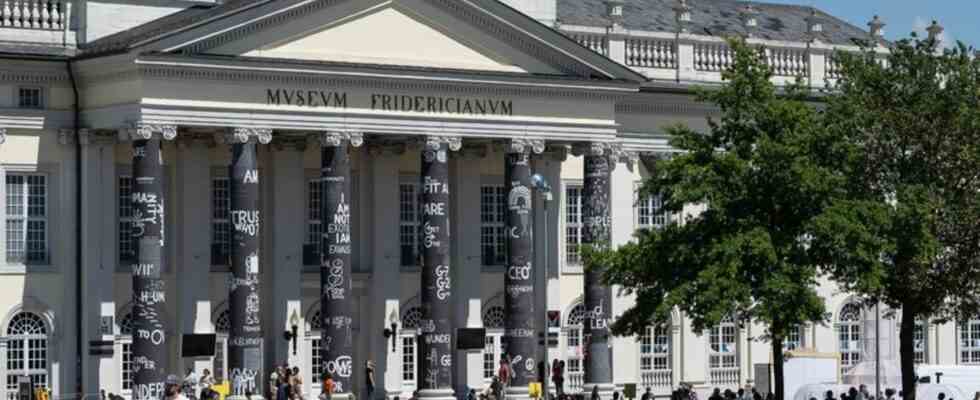art show
documenta: Calls for structural reform are getting louder
Visitors stand in front of the Museum Fridericianum at documenta fifteen. Photo: Swen Pförtner/dpa
© dpa-infocom GmbH
The documenta is considered one of the most important art exhibitions internationally, but it is largely under local direction. After the scandal, calls for reform are now increasing.
In connection with the anti-Semitism scandal at the documenta, calls for a far-reaching structural reform are increasing.
The federal government’s anti-Semitism commissioner, Felix Klein, called on Tuesday for the federal government to have more say in the Kassel art show in the future. “Of course it is now very urgent that action must be taken,” said Klein in Berlin. But there are also fundamental consequences to be drawn.
The federal government should have a say
At documenta fifteen, a work of art by the Indonesian collective Taring Padi that was classified as anti-Semitic was removed after a few days. Previously, there had been anti-Semitism allegations against the curating collective Ruangrupa from Indonesia for months.
Klein said it was about the structure of the documenta, which Minister of State for Culture Claudia Roth (Greens) also wanted to tackle in a five-point plan. Responsibilities are currently divided as follows: the exhibition is sponsored by a non-profit company, and representatives of the state and city sit on the supervisory board of this gGmbH. The chairman of the supervisory board is the mayor of the city of Kassel, Christian Geselle (SPD). The level below is made up of management and artistic direction. Managing director – the position is now called general director – is Sabine Schormann.
The core of the paper by the Minister of State envisages giving the federal government more influence on the documenta in the future. According to Roth, financial support from the federal government should only be provided in the future if it is directly integrated into the structure of the documenta. She will propose to the previous shareholders of the state of Hesse and the city of Kassel to agree on a different structure, it said.
“The documenta is such an important event with a global impact,” affirmed Klein on Tuesday. “It can’t be that the federal government withdraws, that a city like Kassel does it alone and also simply ignores warnings that are issued in public and by the federal government. It can’t stay like this.” The anti-Semitism officer added: “I also think that if federal funds are made available, the federal government must also ensure that it is used responsibly.”
Hesse’s Prime Minister Boris Rhein (CDU) also accused those responsible for documenta of making mistakes on Tuesday. “It was wrong not to have more talks in advance,” he told the “Frankfurter Rundschau” (Tuesday). One will also have to think about “whether the structures of the documenta can remain as they are”. He now expects those responsible “to turn every stone to see if there is still something problematic somewhere.” However, he did not explain exactly who he meant by that in the interview.
Cross-regional expertise is required
The deputy chair of the show’s supervisory board, Hesse’s art minister Angela Dorn, had previously welcomed Roth’s proposals for revising the structures of the documenta gGmbH. After the financial problems of the 14th documenta, there was already agreement among the documenta shareholders to include national and international expertise in the supervisory board in addition to representatives from Kassel and the Hessian state government, the Greens politician said last Friday.
“We agreed that the role of the documenta as one of the world’s most important art exhibitions must be reflected in the supervisory board,” said the Greens politician. “Unfortunately, the considerations of city politics in Kassel failed.”
The general director of the show, Sabine Schormann, was also open to Roth’s plan: “In any case, it is good for an exhibition that has global aspirations if there is corresponding national expertise in the supervisory bodies,” she explained. Whether this is carried out by the federal government or other experts is of secondary importance. “But support from this side is certainly positive.”

